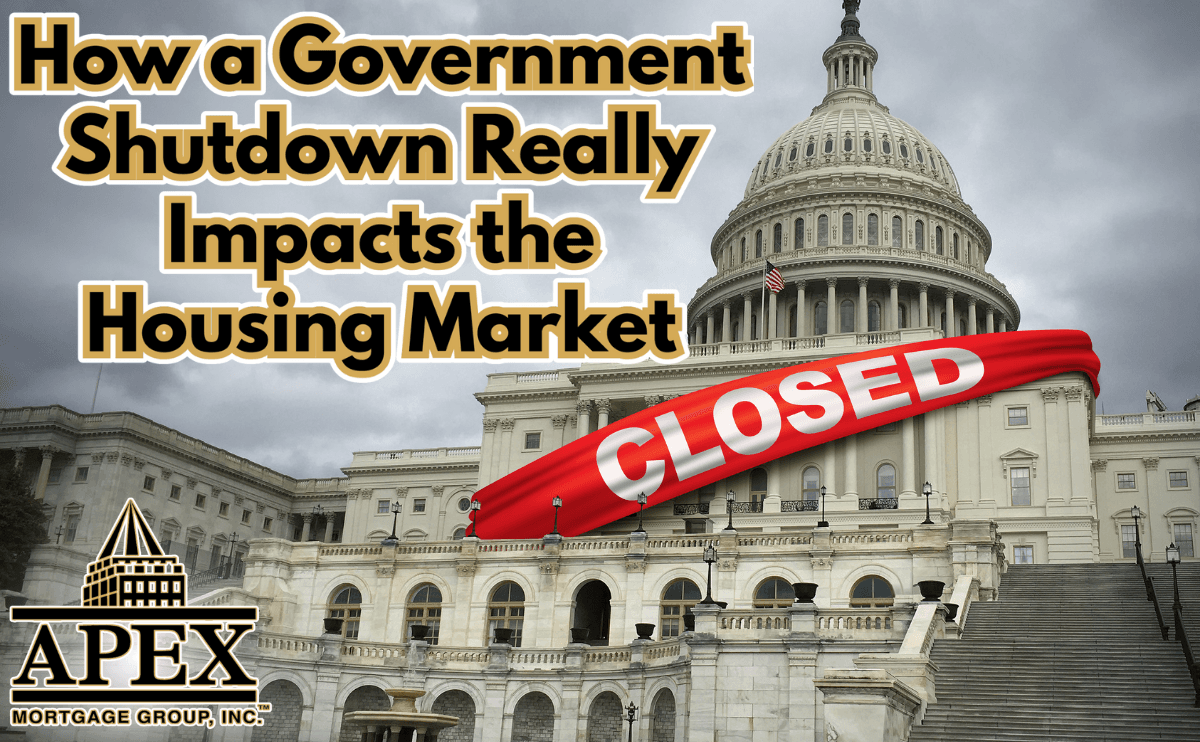By Derric Matz, Apex Mortgage Group Inc.

The short answer: No.
The housing market doesn’t stop. Homes are still being bought and sold, contracts are still being signed, and closings are still happening. The difference is that a few parts of the process may slow down a little — especially where the government plays a role — but overall, the market keeps moving.
What Typically Happens During a Shutdown
When the government shuts down, some federal agencies temporarily close or scale back their operations. This can cause a few hiccups in the real estate process, especially for government-backed loans and insurance programs.
Government-Backed Loans (FHA, VA, USDA)
FHA and VA loans generally continue to be processed, but often with significant delays due to reduced staffing at HUD and the VA.
USDA loans are hit hardest — new loans and guarantees are usually suspended entirely, which can stall purchases in rural areas.
These backlogs can take weeks to clear even after the government reopens.
Conventional Loans (Fannie Mae, Freddie Mac)
These are mostly unaffected since the agencies that manage them operate independently of federal appropriations.
Verification Delays
A common bottleneck comes from reduced staffing at the IRS and Social Security Administration, which can delay income or tax transcript verifications required for most loans.
Flood Insurance
The National Flood Insurance Program (NFIP) can’t issue new or renewal policies during a shutdown. This can put an estimated 1,400 property transactions per day at risk, since many mortgages in flood zones can’t close without active coverage.
Broader Market Effects
Mortgage Rates: Rates may dip slightly as investors seek the safety of U.S. Treasurys during uncertainty, though processing delays can offset that benefit.
Consumer Confidence: Some buyers and sellers may hit pause, leading to a temporary slowdown in market activity.
Regional Impacts: Areas with large federal workforces (like Washington, D.C.) or those dependent on USDA loans and flood insurance tend to feel the impact more acutely.
Economic Data Delays: With agencies like the Bureau of Labor Statistics and the Census Bureau offline, the flow of key housing and employment data pauses, creating uncertainty for analysts and lenders alike.
The Market Usually Bounces Back Fast

History shows these slowdowns are short-lived. During the last major shutdown — a 35-day stretch at the end of 2018 — home sales dipped briefly but rebounded quickly once the government reopened.
According to the National Association of Realtors (NAR), existing home sales slowed for about two months, then jumped back as delayed closings worked their way through the system.
As Selma Hepp, Chief Economist at CoreLogic, explains:
“Applicants for FHA, VA, or USDA loans—which account for about one-quarter of all mortgage applications—may encounter significant processing delays due to agency furloughs.”
And Zillow adds:
“More than 2,500 mortgage originations per working day are at risk of delays during a shutdown.”
Despite these challenges, the housing market continues to function — and once the shutdown ends, it typically catches up quickly.
If you’re currently buying or selling a home, don’t panic. Most deals still move forward, even if it takes a few extra days.
“If you’re expecting to close in a week or a month, there could be some slight delay, but for most people, it’s probably going to be a blip more than a real deal killer.”
— Jeff Ostrowski, Housing Market Analyst, Bankrate
And if you’re just starting to think about making a move, this could actually be an opportunity. When uncertainty causes others to pause, prepared buyers may face less competition — and motivated sellers may be more open to negotiation.
Communicate Early: Stay in close contact with your lender and agent, and consider adding a “government shutdown contingency” to your contract in case timelines need flexibility.
Get Organized: Submit all required documents as early as possible to minimize delays tied to federal verifications.
If You’re a Federal Employee: If a furlough affects your income, contact your mortgage servicer right away. Many lenders offer short-term payment relief or forbearance options.
The Takeaway
A government shutdown might cause a few bumps in the road, but it doesn’t bring the housing market to a standstill. Things may move a little slower, but the momentum always returns once the government reopens.
If you’re wondering what this means for your next move, talk with an Apex Mortgage Group Loan Officer who can help you keep your plans moving forward.
Sources: Keeping Current Matters, NAR, Google


National Director of Marketing
Apex Mortgage Group, Inc | NMLS: 1069868